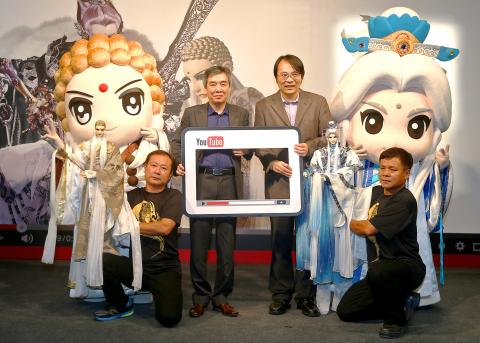Pili International Multimedia has teamed up with YouTube to air its Taiwanese puppet shows on the Web site in an effort to promote the traditional art among overseas viewers.
Starting this week on Wednesday, YouTube viewers can see eight series of puppet shows from Pili Multimedia, company chairman Vincent Huang (黃強華) said.
The shows are to be presented in Taiwanese with English subtitles, he said. The content currently is free, but Pili Multimedia said it might soon introduce a fee.

Photo: CNA
Huang said he hoped viewers around the world would be able to learn more about the culture of budaixi (布袋戲), or Taiwanese traditional puppet theater, through the YouTube clips.
Meanwhile, Google Taiwan managing director Chien Lee-feng (簡立峰) said YouTube is pleased to work with Pili to promote the art abroad. Chien recalled skipping classes when he was a child to watch budaixi.
Hand or cloth puppet shows were first introduced to Taiwan in the Qing Dynasty, and new cultural elements and creative performing styles were adapted to create the popular puppet shows seen today.
Pili International Multimedia evolved in 2000 from a puppet show company that was established in 1992 by Chris and Vincent Huang, members of the nation’s most prominent puppet family.
Their grandfather, Huang Hai-tai (黃海岱), father Huang Chun-hsiung (黃俊雄) and other family members maintained the tradition of finding new ways to advance the art of wooden puppet performances.
The younger Huangs have adopted Hollywood production techniques, as well as computer animated special effects and digital sound effects, to take the traditional art form to a new level since the release of Pili Multimedia’s first puppet film in 2000, Legend of the Sacred Stone (聖石傳說).

A preclearance service to facilitate entry for people traveling to select airports in Japan would be available from Thursday next week to Feb. 25 at Taiwan Taoyuan International Airport, Taoyuan International Airport Corp (TIAC) said on Tuesday. The service was first made available to Taiwanese travelers throughout the winter vacation of 2024 and during the Lunar New Year holiday. In addition to flights to the Japanese cities of Hakodate, Asahikawa, Akita, Sendai, Niigata, Okayama, Takamatsu, Kumamoto and Kagoshima, the service would be available to travelers to Kobe and Oita. The service can be accessed by passengers of 15 flight routes operated by

MORE FALL: An investigation into one of Xi’s key cronies, part of a broader ‘anti-corruption’ drive, indicates that he might have a deep distrust in the military, an expert said China’s latest military purge underscores systemic risks in its shift from collective leadership to sole rule under Chinese President Xi Jinping (習近平), and could disrupt its chain of command and military capabilities, a national security official said yesterday. If decisionmaking within the Chinese Communist Party has become “irrational” under one-man rule, the Taiwan Strait and the regional situation must be approached with extreme caution, given unforeseen risks, they added. The anonymous official made the remarks as China’s Central Military Commission Vice Chairman Zhang Youxia (張又俠) and Joint Staff Department Chief of Staff Liu Zhenli (劉振立) were reportedly being investigated for suspected “serious

Taiwanese and US defense groups are collaborating to introduce deployable, semi-autonomous manufacturing systems for drones and components in a boost to the nation’s supply chain resilience. Taiwan’s G-Tech Optroelectronics Corp subsidiary GTOC and the US’ Aerkomm Inc on Friday announced an agreement with fellow US-based Firestorm Lab to adopt the latter’s xCell, a technology featuring 3D printers fitted in 6.1m container units. The systems enable aerial platforms and parts to be produced in high volumes from dispersed nodes capable of rapid redeployment, to minimize the risk of enemy strikes and to meet field requirements, they said. Firestorm chief technology officer Ian Muceus said

Alain Robert, known as the "French Spider-Man," praised Alex Honnold as exceptionally well-prepared after the US climber completed a free solo ascent of Taipei 101 yesterday. Robert said Honnold's ascent of the 508m-tall skyscraper in just more than one-and-a-half hours without using safety ropes or equipment was a remarkable achievement. "This is my life," he said in an interview conducted in French, adding that he liked the feeling of being "on the edge of danger." The 63-year-old Frenchman climbed Taipei 101 using ropes in December 2004, taking about four hours to reach the top. On a one-to-10 scale of difficulty, Robert said Taipei 101